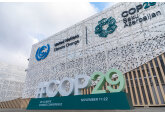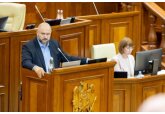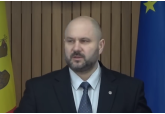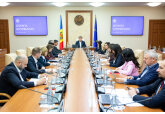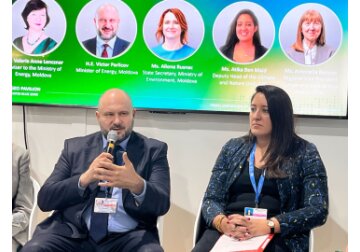
Moldova's green economy and climate resilience through energy reform were discussed at the COP29 session
In particular, green economy opportunities and Moldova's climate resilience were the main topics on the agenda of discussions at a panel organized by the Moldovan Ministry of Energy in the context of the ongoing UN Climate Change Conference (COP29) in Baku. The session discussed, in particular, how Moldova's energy sector can contribute to the transition to a low-carbon green economy, while supporting climate action and strengthening the energy security of the entire region. At a panel organized in the framework of the UN Conference in Baku, Moldovan Energy Minister Victor Parlicov highlighted the impact of consolidating the production of energy from renewable sources, which will contribute to our integration into the regional energy market, promote Moldova as a possible energy exporter, but also reduce dependence on energy imports. “Moldova mainly imports energy, more than 75% is imported. We don't have our own oil and Ukraine and Romania have it, we don't have our own gas and Romania and Ukraine have it. The only option through which Moldova can make a competitive contribution to the integration into the regional market is the development of renewable energy sources. For this reason, namely through the consolidation of renewable energy sources, we can reduce our dependence on imported resources. Moreover, every job in the renewable energy sector is an additional opportunity, means opportunities for economic development and increase of added value,” Victor Parlicov said. The session focused on the 3 pillars necessary for Moldova's green economy and climate resilience, addressing the peculiarities of strategic integration of green energy practices and the necessary transition of our country from fossil fuels to renewable sources through the prism of decarbonization efforts, in line with Moldova's goals and the European Green Deal. In this context, the harmonization of policies with the energy community was also discussed, by strengthening cooperation with regional governments within the energy community, strengthening commitments on climate change adaptation, emission reduction and sustainable energy policies. Increased attention was paid to financial mechanisms and market incentives that would guarantee access to green finance for the implementation of financing strategies for projects focused on renewable energy production. At the same time, the panelists emphasized the important role of promoting green technologies and innovations to attract investment and build competitive and sustainable business models. This year's UN Climate Change Conference (COP29) focuses on green finance and the creation of a new fund sponsored by, among others, fossil energy producers, companies and countries to help countries affected by climate change. The event brings together representatives from 197 countries and aims to accelerate the implementation of the Paris Agreement with a focus on raising global ambition, ensuring climate justice and promoting sustainable development. // 12.11.2024 - InfoMarket


